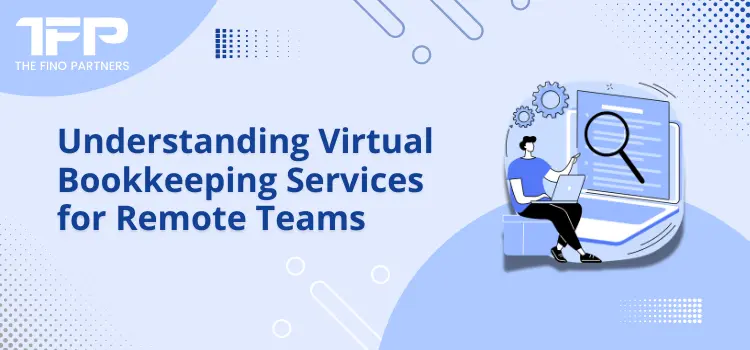The advent of remote labor in the current digital era has changed how companies run. The need for effective, precise, and easily accessible financial management has never been higher as more teams operate remotely. Virtual bookkeeping services are a single option that has become quite common. These services enable businesses, especially those with remote workers, to contract with virtual experts for their financial recordkeeping. With virtual bookkeeping, monitoring funds is scalable, trustworthy, and cheaper than hiring an internal accounting staff. The advantages of outsourcing bookkeeping services, their business, and how they're appropriate for remote teams will all be covered in this article.
Knowing The Roots: What Exactly is Virtual Bookkeeping Services
By using virtual bookkeeping services, a business may delegate its financial responsibilities to a remote bookkeeper or team of bookkeepers. These responsibilities typically consist of maintaining track of financial activities, managing payroll, producing financial reports, and making certain taxes are paid on time. They also involve reconciling bank statements. Businesses may participate with a virtual bookkeeping business that employs cloud-based software to handle and securely store financial data instead of paying employees full-time to carry out these tasks. Businesses using virtual bookkeeping can have access to their financial records via safe online resources at any time and from anywhere in the world. This flexibility can be particularly helpful for remote teams since it gives executives and employees instant access to important financial information, wherever they are in the world.
The Master Stroke: Benefits of Virtual Bookkeeping
1.The Minimal Cost Usage and Flexibility Access
Saving money is one of the primary benefits of using virtual bookkeeping services. Employing full-time, internal bookkeepers can be expensive, even when taking training, perks, and salary into account. On the other hand, businesses using virtual bookkeeping can pay for just the services they call for, either on an hourly charge or as part of a monthly package. Because of this flexibility, businesses may adjust operations up or down based on their needs without having to cover the overhead associated with hiring employees. Additionally, businesses save dollars on equipment and office space because virtual bookkeepers operate remotely. This is what makes virtual bookkeeping so inviting to startups, small and medium-sized businesses, and teams that are scattered.
2. The Simple Case of Accessing Experts
Virtual bookkeeping services give you access to educated, experienced specialists. Virtual bookkeepers ensure that businesses receive top-notch service because many of these are certified accountants or have worked in an array of industries. They keep current awareness of the most current tax laws, accounting rules, and financial reporting instructions, which can assist companies in avoiding costly errors and ensuring compliance. Remote teams may find this knowledge to be very beneficial. Virtual bookkeepers can offer a financial plan counsel, forecasting and budgeting assistance, and insights for improved decision-making.
3. The Path to Accuracy and Enhanced Efficiency
When it arrives at bookkeeping, accuracy is crucial because errors can result in financial losses, problems with compliance, and tax difficulties. Virtual bookkeepers minimize the potential of human error by automation numerous accounting processes with advanced software. Tasks like payroll, reconciliation, and invoicing are accelerated up by this automation, giving organizations access to precise outcomes on time. Virtual bookkeeping removes the need for remote employees to deal with financial paperwork in person. The digitalization and secure cloud storage of all transactions and reporting makes it simpler to maintain tabs on costs, control cash flow, and ensure all financial data is correct and updated.
4. The Robust System: The Security Requirements
One of the primary worries with virtual bookkeeping is data security. In order to safeguard sensitive financial data, reputable virtual accounting firms use safe cloud-based platforms featuring multi-factor authentication and encryption. This assures that any data is kept confidential and that only those with permission can access it. The capacity for securely transferring financial data across sites is crucial for employees working remotely. Virtual bookkeepers provides a centralized system in which all records are safely kept, reducing the possibility of data breaches and guaranteeing compliance to privacy regulations.
5. The Financial Reporting of the Hour: Real-Time Setting
Businesses can get real-time financial data with virtual accounting services, which is vital to making informed choices. Business owners and remote staff can rapidly access accounting records, balance sheets, and various other reports through cloud-based technologies. Because of this transparency, management is able to maintain an eye on cash flow, keep tabs on expenditure, and make growth plans using current and accurate information. Since cooperation may be dispersed in remote teams, real-time reporting is quite useful. Quick availability of financial data facilitates decision-making quicker and guarantees that all parties, wherever they happen to be, are operating with the same data.
The Procedures in-Place: How Virtual Bookkeeping Works
A streamlined procedure typically follows by virtual bookkeeping services. Businesses use safe electronic means to supply their financial data, including bank statements, invoices, and receipts. After that, the virtual bookkeeper utilizes cloud-based accounting software like FreshBooks, Xero, or QuickBooks to process this data. Financial reports are created, accounts reconciled, and transactions are classified automatically using this software. Additionally, the bookkeeper maintains interaction with the business, giving updates, responding to inquiries, and giving financial guidance as needed. With email, phone, or video conferencing being the main means of communication, distant teams can easily maintain contact with the virtual bookkeeping firm.
Final Thoughts
Virtual bookkeeping services offers a present-day, practical, and economical method to handle financial operations for remote teams. Businesses are able to focus on what they do best and maintain accurate, secure, and current financial data by outsourcing bookkeeping to experts. In addition to saving time and money, virtual bookkeeping offers organizations the resources and knowledge they need to expand. Virtual bookkeeping could help any size organization, including new businesses, small businesses, and huge corporations with remote staff members in managing their money and coming to smarter business decisions. Fino Partners can be your go to solution for outsourcing accounting services if your business decides to allocate accounting needs.



























